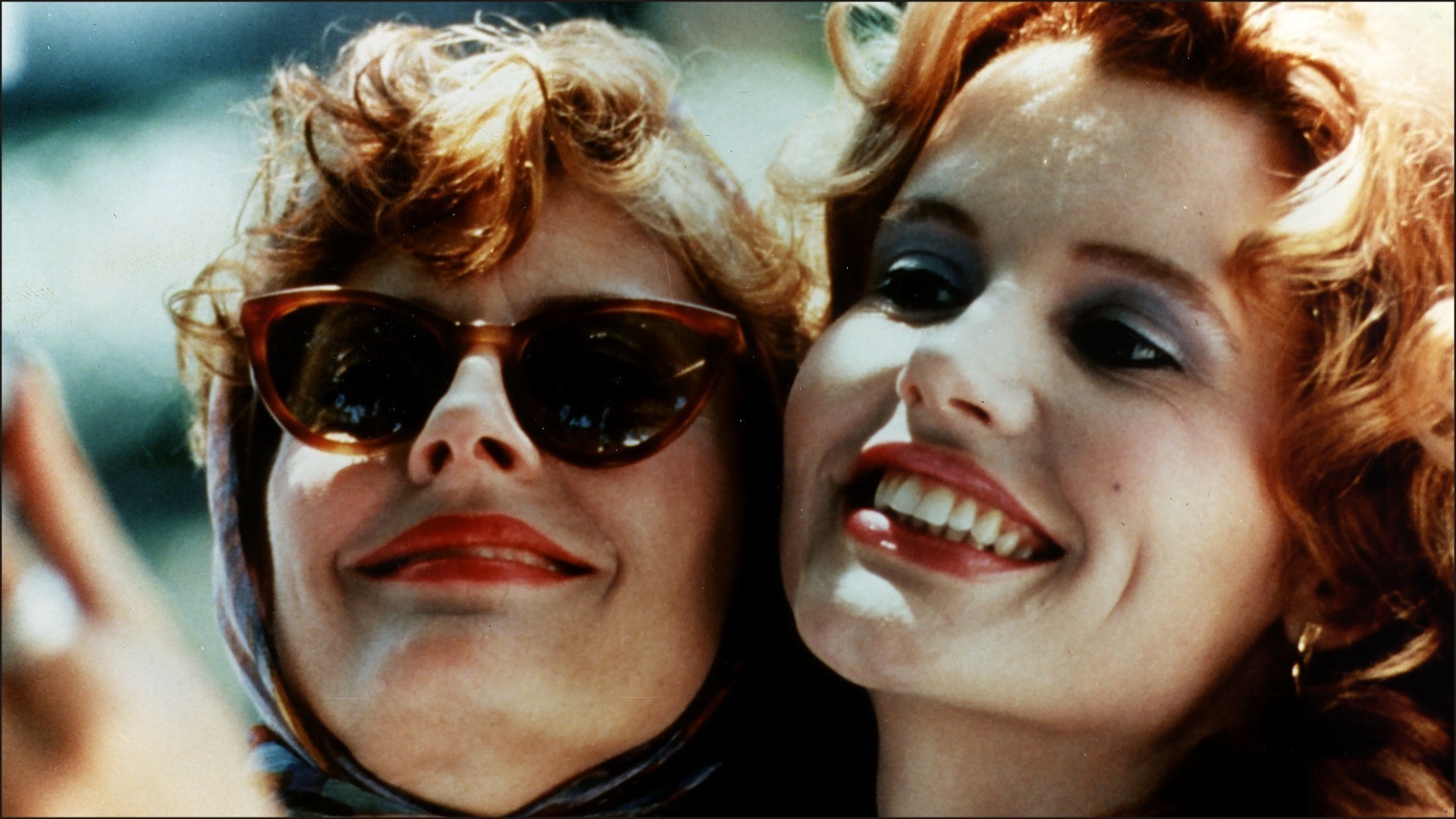Even though you know what happens at the end of Thelma & Louise, and even if you’ve seen the film six or seven times, the final scene still retains its capacity to shock, surprise, and ultimately, move you. Surrounded by cop cars after their unplanned crime spree eventually catches up with them, the two women embrace and Louise puts her foot down, driving their 1966 Ford Thunderbird off the edge of the Grand Canyon. They would rather plunge to a certain death than get caught and sent to prison.
As this classic film turns 25 years old, any controversy it caused back in the day is now firmly in the rear view mirror. However, its blazing feminist message remains undimmed. Geena Davis’s Thelma and Susan Sarandon’s Louise become fugitives on the run because they know the police won’t believe that Thelma was in the process of being raped when Louise interrupted the assault with a gun. “You know that jerk was really hurting me, and if you hadn’t come along when you had, he would’ve hurt me even worse,” Thelma tells Louise towards the end of the film. “And probably nothing would’ve been done with him because I was dancing with him all night and everybody saw it and they’d figure I had it coming.” Given that rape convictions are still notoriously hard to secure, and it was estimated by the Department of Justice in 2014 that there were over 400,000 untested rape kits in the US, Thelma’s point, sadly, still stands.
Of course, part of the film’s power is purely visual. Because it’s nearly always the guys who get to behave like badasses on the big screen, it’s fun and still a little subversive to watch two women firing guns, driving a getaway car, taking down a cop and blowing up a male chauvinist’s lorry after he repeatedly disrespects them. But Thelma and Louise’s rapid self-empowerment is even more thrilling because Callie Khouri, who would win an Oscar for writing the film’s screenplay, makes it inextricable from their mistakes. After all, Louise’s predicament is especially complicated because she didn’t gun down Thelma’s rapist during the act, when her friend was in immediate danger, but a few moments after, when he was goading them with crude sexually abusive language.
Later, Thelma enjoys a long overdue sexual awakening when she spends the night with Brad Pitt’s luminously handsome but opportunistic cowboy. “You finally got laid properly, I’m so proud,” Louise smiles the next morning, shortly before she realises that Thelma has absent-mindedly left him alone with their cash. The pair are now penniless as well as wanted women, so Thelma carries out an armed robbery to fund their final push to Mexico. It’s a criminal act, but also one of massive self-actualisation for Thelma. “I don’t recall ever feeling this awake,” she says to Louise in the film’s final stretch. “You know, everything looks different now. You feel like that? You feel like you got something to live for now?”
Though Thelma & Louise didn’t create the wave of fierce, female-led movies many at the time hoped, both of its stars have, in their own ways, carried on the film’s strident spirit.
Though Thelma & Louise didn’t create the wave of fierce, female-led movies many at the time hoped, both of its stars have, in their own ways, carried on the film’s strident spirit. Founded in 2004, the Geena Davis Institute on Gender in Media is a non-profit organisation which aims, through research and education, to increase and improve the portrayal of female characters in children’s entertainment. Davis also chairs the Bentonville Film Festival, which champions women and diverse voices in the media.
Sarandon may have raised a few eyebrows when she called feminism an “old-fashioned word” in 2013, but this hardly diminishes her impact as a smart, articulate older woman in the public eye who is unafraid to speak her mind. She remained steadfast when Piers Morgan body-shamed her for showing cleavage as she introduced this year’s Screen Actors Guild Awards In Memoriam segment, and has spoken eloquently about her political choices in the run-up to the US Presidential election, pointing out that it’s sexist to presume she should favour Hillary Clinton over Bernie Sanders simply because she is a woman. Just last week at the Cannes Film Festival, she offered a no-holds-barred view of Woody Allen’s alleged sexual assault of a minor, something few other Hollywood actors have been willing to do.
During a recent interview with Entertainment Weekly to celebrate Thelma & Louise’s 25th anniversary, both women spoke about the future of female representation on screen. Sarandon noted that “it’s very hard for executives to identify with women. They don’t see women as heroic.” Davis said, bluntly but optimistically: “The ratio of male characters to female characters [on screen] has been exactly the same since 1946. Most people say things are better now – there’s The Hunger Games, there’s been Bridesmaids. But it’s not yet. It will be, and I think soon.” With industry eyes now watching how this summer’s female-led Ghostbusters movie fares at the box office, let’s hope Davis is right.
Credits
Text Nick Levine
